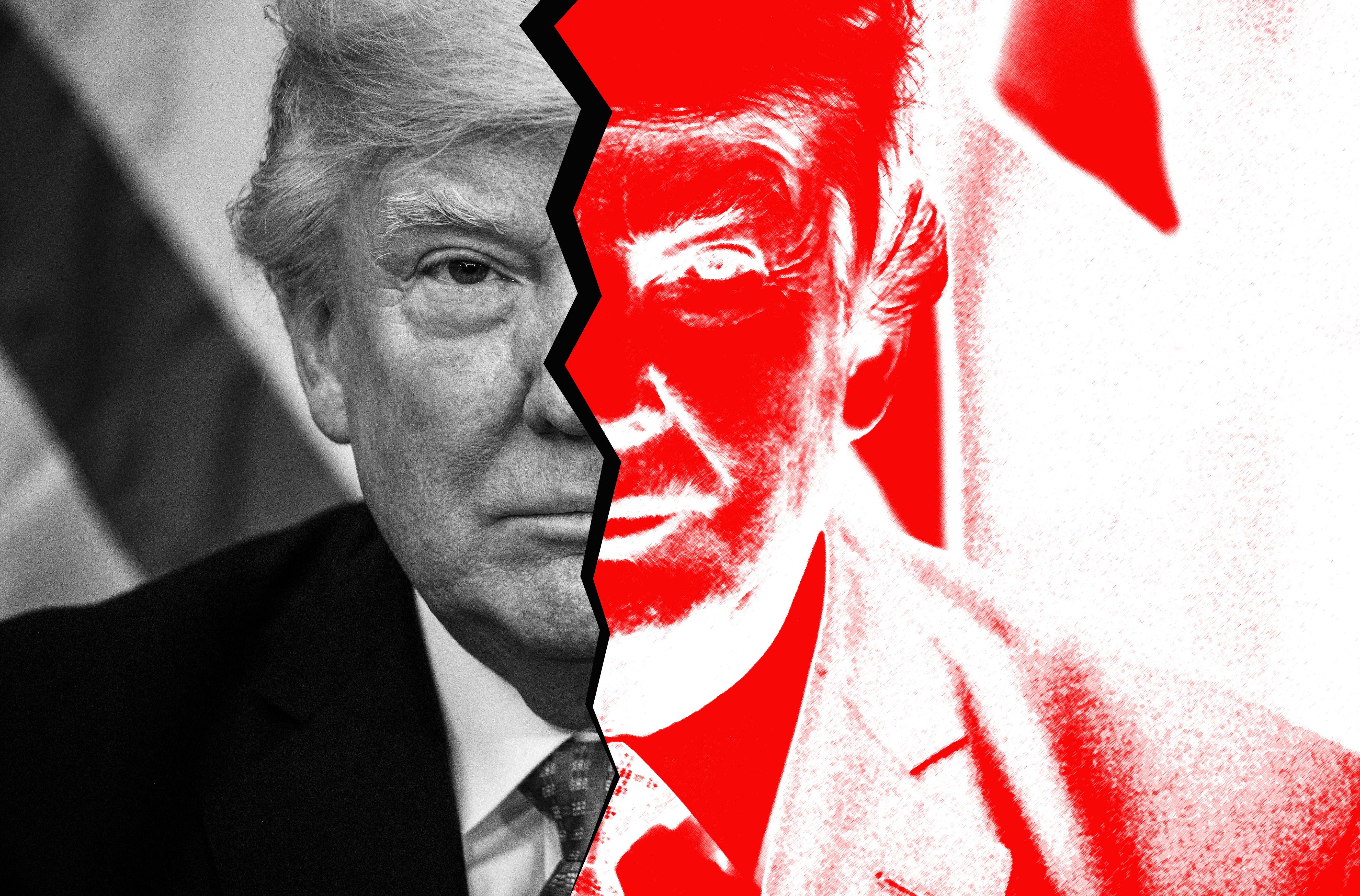Dr. Jekyll and Mr. Trump
Trump's speech in Saudi Arabia was great. More please!


A free daily email with the biggest news stories of the day – and the best features from TheWeek.com
You are now subscribed
Your newsletter sign-up was successful
When Donald Trump has the mind to do so, he can act exactly the way Americans expect a president to act. He proved that again in Saudi Arabia on Sunday, with his speech to the Gulf Cooperation Council. Gone was the clash of civilizations between the West and Islam that characterized Trump's rhetoric on the campaign trail. Instead, he spoke in sober tones of cooperation — and while his words may have come from a speechwriter, it was the attentiveness as Trump read them off the teleprompter that marked the difference between this Trump and the flailing incompetent that has dominated headlines for weeks. This Trump cared enough to get something right.
Delivering a speech without going off script is a low bar, to be sure. And the speech itself was quickly overshadowed, at least for much of the online commentariat, by a striking image to which the president unwisely lent himself afterwards: along with King Salman of Saudi Arabia and Egypt's President Sisi, Trump inaugurated a new Global Center for Combating Extremist Ideology with a photo op showing the trio laying hands upon a glowing orb — an image that might have come straight out of the next Star Wars movie. So yes, the president's first foreign trip has had its share of missteps. But the centerpiece speech of the visit to Saudi Arabia showcased President Trump as Dr. Jekyll, for once, rather than Mr. Hyde.
Trump still sounded like himself in Riyadh — just a more focused and conventional version. He insisted that "Muslim-majority countries must take the lead in combating radicalization" and that "America is a sovereign nation and our first priority is always the safety and security of our citizens." He defined his approach as a "principled realism" that would be markedly less ideological and values-based than the foreign policy of George W. Bush or Barack Obama. "We are not here to lecture," he said, "we are not here to tell other people how to live, what to do, who to be, or how to worship." He drew a particular contrast with Bush when he said, "We will be guided by the lessons of experience, not the confines of rigid thinking. And, wherever possible, we will seek gradual reforms — not sudden intervention." The last Republican president had spoken of lighting "a fire in the minds of men," a phrase with revolutionary connotations. Trump may not have named Bush directly, but the implied criticism was clear — and consistent with Trump's campaign-trail polemics of last year.
The Week
Escape your echo chamber. Get the facts behind the news, plus analysis from multiple perspectives.

Sign up for The Week's Free Newsletters
From our morning news briefing to a weekly Good News Newsletter, get the best of The Week delivered directly to your inbox.
From our morning news briefing to a weekly Good News Newsletter, get the best of The Week delivered directly to your inbox.
What was different about Sunday's Trump was his willingness to frame the struggle against terrorism in terms that did not reduce to sectarianism. "When we see the scenes of destruction in the wake of terror, we see no signs that those murdered were Jewish or Christian, Shia or Sunni," he said. "We see only that they were children of God whose deaths are an insult to all that is holy." These were well-written words. They were also, however, a sign that the president himself is far more capable of rising to an occasion than his critics — or his own typical behavior — might suggest. Is Trump capable of such discipline on a regular basis? He will have to be if his administration is to avoid devouring itself, as it looked set to do in the week leading up to his trip abroad.
The American public took a chance on Trump last November in large part because of his stark criticism of Washington's foreign policy under Democrats and Republicans alike in recent years. "Principled realism" sounds like a good start toward defining his own position, not merely criticizing that of the bipartisan establishment. But articulating a positive theme is still a far cry from articulating — let alone implementing — better policies. While in Saudi Arabia, Trump signed a $110 billion arms deal with the kingdom. That will be a boon to American industry, Trump boasts, but it will also enable Saudi Arabia to escalate the war against Houthi rebels in neighboring Yemen. The civil war between Yemen's Saudi-backed government and the Houthis, among many other factions, has pushed that country to the brink of famine. Is it principled of the U.S. to give Riyadh a blank check in this conflict? Is it in really America's interests to get further involved — by proxy or otherwise — in yet another multi-sided Middle East war?
Trump will have to focus much harder in the months to come on answering such questions, not only for our allies but for the American people and Congress. Trump's remarks in Riyadh singled out Iran as "responsible for so much instability in the region," a state sponsor of the Houthis and Hezbollah and key ally of Bashar al-Assad in Syria's brutal civil war. Yet myriad problems in the Middle East, starting with ISIS and al Qaeda, have little or nothing to do with Iran, and not every regional power struggle in which Iran is involved is amenable to American-imposed solutions. Bush and Obama both learned the hard way just how complex the politics of the Middle East and North Africa really are. Trump's "principled realism" threatens to oversimplify just as much, if it identifies America's interests with those of Riyadh. That Saudi Arabia has been the sponsor of much Islamic fundamentalism that readily shades into extremism must never be overlooked — even if it could not be spoken out loud in the president's speech.
Much more than the controversies of the past week, this is the real tragedy of the Trump presidency so far: that what should be, for all its obvious faults, a break with the failures of the past is instead repeating them — because as shocking as President Trump may be, where it counts, in the realm of policy reform of the sort demanded by voters — and not just his own voters — he has yet to be radical enough. The Riyadh speech, however, was a step forward from the confusion into which the Trump administration had dashed headlong mere days before. More of this Trump, please.
A free daily email with the biggest news stories of the day – and the best features from TheWeek.com
Daniel McCarthy is director of the Novak Journalism Fellowship Program at the Fund for American Studies, the editor of Modern Age, and a columnist at The Spectator. His freelance journalism has appeared in a variety of publications in the U.S. and internationally, including the New York Times, the Daily Telegraph, The National Interest, and Reason.
-
 The Olympic timekeepers keeping the Games on track
The Olympic timekeepers keeping the Games on trackUnder the Radar Swiss watchmaking giant Omega has been at the finish line of every Olympic Games for nearly 100 years
-
 Will increasing tensions with Iran boil over into war?
Will increasing tensions with Iran boil over into war?Today’s Big Question President Donald Trump has recently been threatening the country
-
 Corruption: The spy sheikh and the president
Corruption: The spy sheikh and the presidentFeature Trump is at the center of another scandal
-
 The billionaires’ wealth tax: a catastrophe for California?
The billionaires’ wealth tax: a catastrophe for California?Talking Point Peter Thiel and Larry Page preparing to change state residency
-
 Bari Weiss’ ‘60 Minutes’ scandal is about more than one report
Bari Weiss’ ‘60 Minutes’ scandal is about more than one reportIN THE SPOTLIGHT By blocking an approved segment on a controversial prison holding US deportees in El Salvador, the editor-in-chief of CBS News has become the main story
-
 Has Zohran Mamdani shown the Democrats how to win again?
Has Zohran Mamdani shown the Democrats how to win again?Today’s Big Question New York City mayoral election touted as victory for left-wing populists but moderate centrist wins elsewhere present more complex path for Democratic Party
-
 Millions turn out for anti-Trump ‘No Kings’ rallies
Millions turn out for anti-Trump ‘No Kings’ ralliesSpeed Read An estimated 7 million people participated, 2 million more than at the first ‘No Kings’ protest in June
-
 Ghislaine Maxwell: angling for a Trump pardon
Ghislaine Maxwell: angling for a Trump pardonTalking Point Convicted sex trafficker's testimony could shed new light on president's links to Jeffrey Epstein
-
 The last words and final moments of 40 presidents
The last words and final moments of 40 presidentsThe Explainer Some are eloquent quotes worthy of the holders of the highest office in the nation, and others... aren't
-
 The JFK files: the truth at last?
The JFK files: the truth at last?In The Spotlight More than 64,000 previously classified documents relating the 1963 assassination of John F. Kennedy have been released by the Trump administration
-
 'Seriously, not literally': how should the world take Donald Trump?
'Seriously, not literally': how should the world take Donald Trump?Today's big question White House rhetoric and reality look likely to become increasingly blurred
